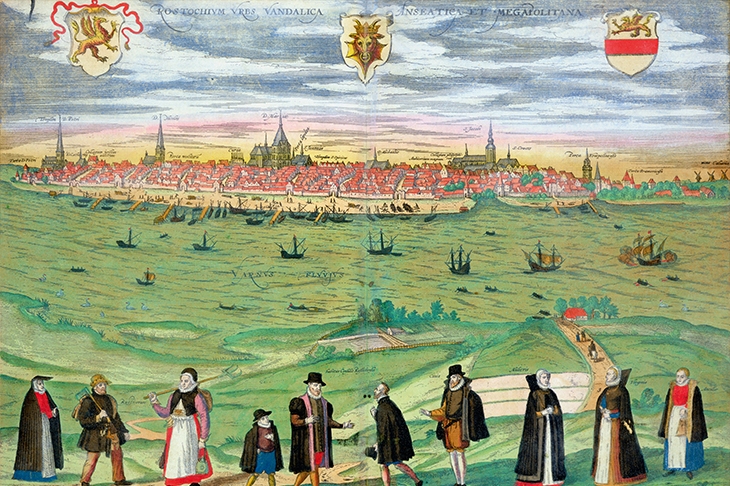Go into any high street bookshop and find the European history section. There’s usually a shelf or two on France and about the same on Germany, but the difference between these two categories is apparent straight away. The French stuff spans several centuries, whereas German history is confined to just 12 years.
Yes, a lifetime since the death of You-Know-Who, Britons are still obsessed with the Third Reich, and who can blame us? It remains the most bizarre and awful epoch in European history and we’re still reeling from its consequences. What’s less forgivable is our wilful ignorance about anything that came before (my son learnt all about the Nazis for his history GCSE, but it wasn’t until he did A level that he got onto Bismarck). This is the purpose of James Hawes’s compact primer. You can read it in an afternoon, but it’ll give you a good overview of German history — and even some idea of what makes modern Germans so different from modern Brits.
Hawes read German at Oxford and has lectured in German at Sheffield and Swansea universities, but he’s also a novelist and his pithy style combines the best of both trades. He knows what he’s on about and his conclusions are measured, but he favours clear, concise prose over dense academese. He has a sense of humour, and a sharp eye for similarities between then and now. I was tickled to learn that Romans used to moan about German migrants, much as Little Englanders complain about Eastern Europeans today.
Sure, we all know what happened when the Roman Empire reached breaking point, but Hawes argues that Germany was Rome’s successor, rather than its destroyer. The Holy Roman Empire (a.k.a. the First Reich) may not have been holy, Roman or an empire, but it was still a bastion of Christian civilisation throughout the Dark Ages, and the distant ancestor of today’s EU. Look at the map of Charlemagne’s empire in 800 AD: its borders are virtually identical to the borders of the six founder members of the EEC.
An absence of natural borders has always been Germany’s biggest headache, especially in the east. German knights and merchants founded Riga, Tallinn and Danzig, and so these Hanseatic ports became Germanic, while the lands around them remained Slavic (even stripped of their German populations, these cities still feel intensely Teutonic). For 1,000 years, since Charlemagne, Germany was a concept rather than a country, a group of people defined by a common language and often not much else. Throw in the trauma of the Thirty Years War (in which a third of the population perished) and defeat in two world wars, and you can understand why most Germans regard the EU as the solution to their problems —and why most Britons don’t.
The way Hawes sees it, Prussia is the source of all of Deutschland’s woes. It hijacked Germany under Bismarck, drove the Germans into war under Kaiser Bill and voted Hitler into power. Eradicated by the Allies, its ghost lived on in the GDR and remains an endless drain on West German resources. Without those warlike Prussians, Germany would have remained a peaceful and prosperous place, ‘a land where state worship, puritanical zeal and scar-faced militarism have always been alien’. In short, it would have been a lot like Switzerland —rich, enchanting, and of no interest to historians whatsoever.
You might think Hawes would have his work cut out trying to cram 2,000 years into 226 pages, but he still finds room for some interesting asides about the perils facing Germany (and Europe) today. ‘Europe is far too weak and divided to stand in for the US strategically; and, without US leadership the West cannot survive,’ declared Joschka Fischer, Germany’s former foreign minister. ‘Thus, the western world as virtually everyone alive today has known it will almost certainly perish before our eyes.’
So what does this current crisis have to do with German history? Well, as Hawes outlines in this excellent little book, the solutions nations seek are shaped by past experience, and in this respect Germany and Britain could scarcely be less alike. Germans have been familiar with federal institutions ever since Charlemagne. Germany has only been a nation since 1871 and its experience of nationalism was a disaster. History has taught the British that we’re best off one step removed from Europe, whereas it has taught the Germans that they’re far better off as part of a supra-national superstate. Really, it’s a wonder we agree about anything at all.
Where Hawes differs from many of his fellow Brits is that he sees Germany as Europe’s best hope for the future, and I must say I agree with him. Only Germany has the economic muscle and the moral will to make Europe work. The question for Britain is whether we want to be inside this project or outside it. Well, we’ve answered that question now, and we should wish the Germans all the best (while it might be some fleeting comfort for us if the EU went tits up, it’s hard to see how it would help us). If Theresa May is looking for a good model for Anglo-German co-operation after Brexit, perhaps she should mug up on Hawes’s chapter on the German Confederation. After the Battle of Waterloo, for half a century, Britons regarded the Germans as our cousins. Maybe one day we will learn to do so again.






Comments